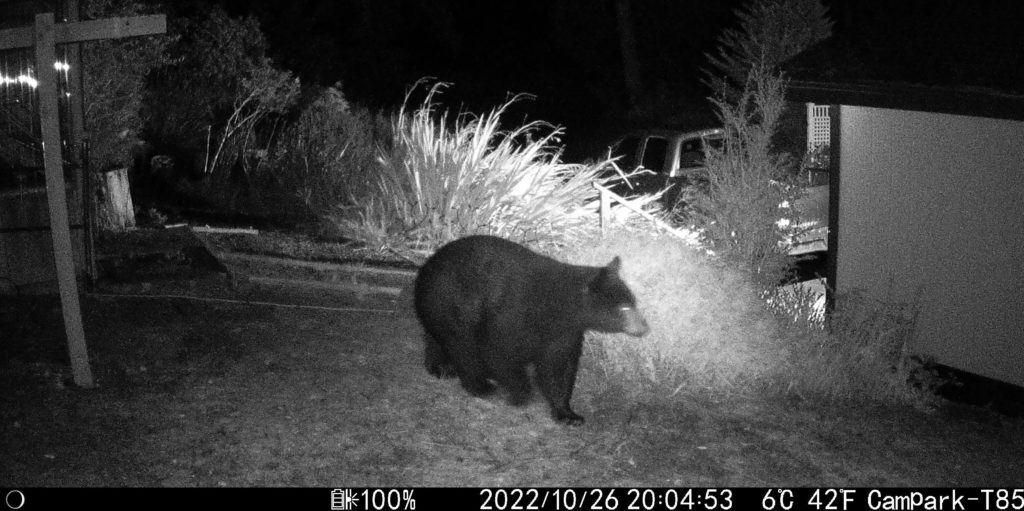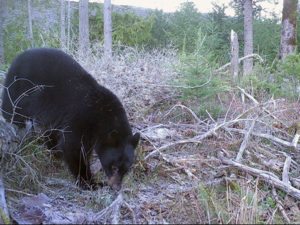
By DANA TIMS/YachatsNews.com
Black bears — driven by failures in their normal autumn food supplies — are rummaging through garbage cans up and down Oregon’s central coast and generally alarming residents not used to such blatant fall intrusions.
“I’m getting bear calls from all over my district,” said Jason Kirchner, an Oregon Department of Fish and Wildlife biologist in Newport. “We’re not seeing any signs of aggression, but it’s very important that folks know what they should and shouldn’t be doing regarding bears.”
Bears along the coast are eating as much as they can right now in preparation for hibernation, he said. But the blackberries and apples they normally rely on have either been eaten already or have shriveled up because of the very dry September and October, leaving bears to look elsewhere for their meals.

“This is the part of their season when they really need to put some pounds on,” Kirchner said, “and they’re running out of food.”
Longtime Yachats resident Pam Sullivan got a startling lesson in bear behavior over Labor Day weekend when she looked out her kitchen window on Reeves Circle and saw a large black bear tipping over a neighbor’s garbage can.
“He was huge,” said Sullivan, noting it was the first time in nine or 10 years that a bear has come down from the woods high on the east side of U.S. Highway 101 to search for food. “I immediately got on the phone and called everyone I knew around here to let them know to be careful.”
The night before, she had taken her miniature dachshund, Charlie, outside before going to bed.
“Charlie got real quiet and just stared into the bushes,” Sullivan said. “We couldn’t see anything, but it felt pretty scary. We hightailed it back into the house as fast as we could.”
Residents in the area are now breaking with their long-term pattern of pulling garbage cans out to the curb the night before pick-up.
“Everyone is waiting until the regular Monday morning pick-up time,” Sullivan said. “You’re just asking for trouble otherwise.”

A bear’s diverse diet
ODFW says Oregon is home to about 25,000 to 30,000 black bears, the most common bear species in North America. Fast and agile, they are good swimmers and climbers who prefer forests, trails and streams. The bears are omnivorous and have a diverse diet including berries, fruit, grasses and plants. Although they will consume small mammals, insects and amphibians, black bears are not usually active predators.
Although attacks by black bears are very uncommon, they aren’t unheard of, either.

A woman in the Leavenworth area of Washington was charged by an adult female black bear in late October after she let her dog out. She ended up in the hospital with injuries described as not life threatening.
During her effort to fight off the bear, the woman struck the animal in the face, sending it running back into the woods.
Police in Medford said they were forced to shoot a black bear Sept. 6 after it lunged at officers when it came down from a tree the day after it attacked a woman in her backyard.
But those incidents are unusual, Kirchner said.
“It’s more than fair to point out that most bears are afraid of people,” Kirchner said. “But, ultimately, when food is short, they come into every town and every neighborhood. It’s just part of living on the coast.”
In the past week alone, he said, he’s fielded at least 10 calls from residents reporting bear activity in their area.
An increase in the use of doorbell and porch security cameras, such as the popular Ring cameras, have certainly contributed to greater visibility of wandering bears.
“Ten to 20 years ago, a bear walks in front of your house in the middle of the night, and you might never know,” said Mathew Vargas, assistant district wildlife biologist with Oregon Department of Fish and Wildlife in Medford.
Oregon is home to between 25,000 and 30,000 black bears, according to his agency’s website. Their diet consists of berries, fruit, grasses and plants. While known to consume small mammals, black bears are not usually considered active predators.
Female black bears, which range in size from 90 to 300 pounds, usually go into hibernation beginning in late October and extending into mid-November. Males, which weigh between 125 and 500 pounds, depending upon age, season and food, begin hibernating in late November.
Wildlife officials, in stressing that coastal residents should be “Bear-Aware,” provide a number of tips to bear proof peoples’ yards. They include:
- Keeping pet food indoors and feed pets only in the house, garage or enclosed kennel;
- Hanging bird feeders from a wire at least 10 feet off the ground and 6 to 10 feet from the trunk of a tree;
- Removing fruit that has fall from trees;
- Securing garbage cans in a garage, shed or behind a chain link or electric fence. Dahl Disposal and other coastal garbage haulers also have bear-proof cans;
- Keeping barbeques clean and store them in a shed or garage;
- Talking to neighbors to encourage everyone in the neighborhood to remove attractants.
“They’re big and I don’t trust them,” Sullivan said. “But, certainly, no one wants them killed, either. We just want them to go to sleep.”
That usually happens in December, wildlife biologist say.
- Dana Tims is an Oregon freelance writer who contributes regularly to YachatsNews.com. He can be reached at DanaTims24@gmail.com


